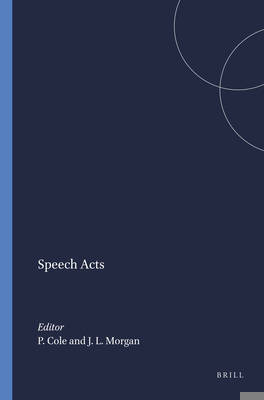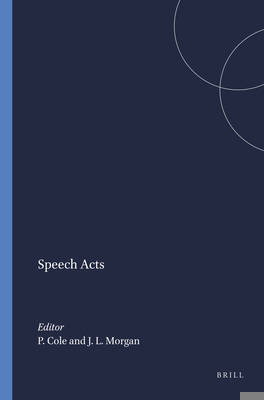
- Afhalen na 1 uur in een winkel met voorraad
- Gratis thuislevering in België vanaf € 30
- Ruim aanbod met 7 miljoen producten
- Afhalen na 1 uur in een winkel met voorraad
- Gratis thuislevering in België vanaf € 30
- Ruim aanbod met 7 miljoen producten
Zoeken
Omschrijving
Both linguists and philosophers have, for a number of years, been interested in the concept of speech acts, first proposed by J. L. Austin; but each discipline has remained uniformed on the often parallel work of the other. This volume brings together linguistic and philosophical approaches to speech acts, in order to bring out agreements and disagreements.
Many of the articles focus on the problem of indirect speech acts, or "conversational implicature".Such indirect speech acts are a major impediment to a coherent, explanatory account of the relation between sound and meaning, since it is not clear whether the use of a sentence to perform and indirect speech act is part of the sentence's linguistically significant meaning, to be handled by syntactic rules, or whether this use is best explained on some other basis, such as a theory of language use. In this volume, such philosophers as John Searle and H. P. Grice examine the relation between the content of a sentence and the conditions under which it can be used to perform a given speech act, while such linguists as John Robert Ross, Georgia M. Green, and Jerrold M. Sadock show that the illocutionary intent of a speaker is often reflected in the syntactic properties of the sentence he uses.
This book, with its full airing of the controversy regarding the status of conversational implicature and syntactic rules, will be invaluable to both linguists and philosophers concerned with semantics and pragmatics.
Many of the articles focus on the problem of indirect speech acts, or "conversational implicature".Such indirect speech acts are a major impediment to a coherent, explanatory account of the relation between sound and meaning, since it is not clear whether the use of a sentence to perform and indirect speech act is part of the sentence's linguistically significant meaning, to be handled by syntactic rules, or whether this use is best explained on some other basis, such as a theory of language use. In this volume, such philosophers as John Searle and H. P. Grice examine the relation between the content of a sentence and the conditions under which it can be used to perform a given speech act, while such linguists as John Robert Ross, Georgia M. Green, and Jerrold M. Sadock show that the illocutionary intent of a speaker is often reflected in the syntactic properties of the sentence he uses.
This book, with its full airing of the controversy regarding the status of conversational implicature and syntactic rules, will be invaluable to both linguists and philosophers concerned with semantics and pragmatics.
Specificaties
Betrokkenen
- Uitgeverij:
Inhoud
- Aantal bladzijden:
- 424
- Taal:
- Engels
- Reeks:
- Reeksnummer:
- nr. 3
Eigenschappen
- Productcode (EAN):
- 9789004368576
- Verschijningsdatum:
- 1/01/1975
- Uitvoering:
- Hardcover
- Formaat:
- Genaaid
- Afmetingen:
- 155 mm x 235 mm
- Gewicht:
- 827 g

Alleen bij Standaard Boekhandel
+ 360 punten op je klantenkaart van Standaard Boekhandel
Beoordelingen
We publiceren alleen reviews die voldoen aan de voorwaarden voor reviews. Bekijk onze voorwaarden voor reviews.







